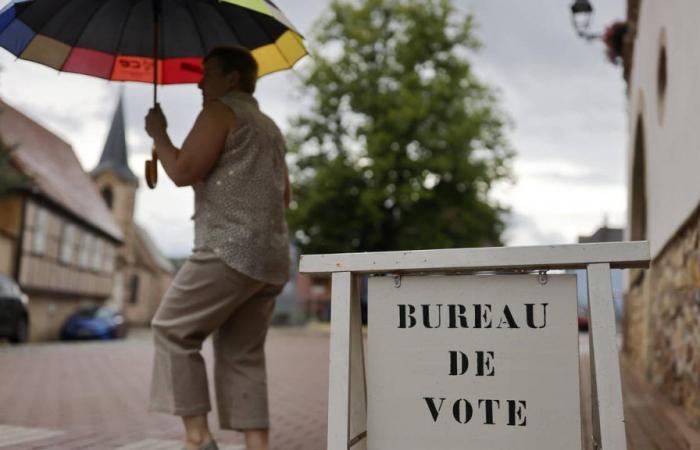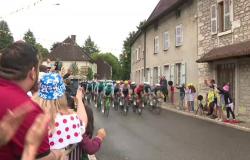Understanding the mechanism: What is a triangular and why is it decisive this year in France?
Deadline: Tuesday 6 p.m.
Candidates still in the running have until Tuesday 6 p.m. to decide whether to withdraw and thus drastically reduce the number of three-way races, which stood at more than 300 on Sunday evening due to the high turnout in the first round (66.7%).
On Sunday, the navy blue wave broke with more than 10.6 million votes, or 33.1% of the vote, a historic level – excluding the second round of the 2022 presidential election. The RN has already elected 39 deputies, starting with Marine Le Pen in Pas-de-Calais. The party with the flame, allied with Eric Ciotti, qualified in 443 of the 577 constituencies and is in the lead in 296 of them.
With 27.99%, the NFP already has 32 elected representatives. But it lost the communist Fabien Roussel, swept away by the RN tidal wave in the North. Another of its leading figures, François Ruffin, is in a difficult position in the Somme even with the withdrawal of the Macronist candidate.
The outgoing majority is taking stock after its defeat (20.8% of the vote). While Gabriel Attal is one of about ten ministers likely to win on Sunday, four others are off to a bad start.
Find our articles on the French legislative elections
The President’s Plan
Emmanuel Macron told his ministers gathered at the Elysée that “not a single vote” should “go to the far right”, recalling that the left had mobilized against the RN in 2017 and in 2022, allowing its own accession to the Elysée, according to a participant. However, he did not give a clear instruction to withdraw from the second round, according to several ministerial sources.
While several Renaissance candidates who came third have already announced their withdrawal, such as Sylvie Casenave-Péré, who came third behind Marie-Caroline Le Pen in Sarthe, some intend to stay, believing they have more reserves of votes than the left, or that their withdrawal would favour the RN, such as Loïc Signor in Val-de-Marne.
The outgoing majority is struggling to speak with one voice when it comes to supporting a rebellious candidate between those who, like Edouard Philippe or Bruno Le Maire, want “neither the RN nor LFI”, those who take a “case-by-case” approach like the outgoing president of the Assembly Yaël Braun-Pivet and those who, on the left wing, do not set any conditions.
Anything rather than the RN’s “disastrous project”, this is the line defended by the Prime Minister, who spoke with the candidates by videoconference on Monday afternoon. On TF1 on Monday evening, he called on the French to elect “a plural National Assembly” to “prevent the National Rally from having an absolute majority”, because “that would be catastrophic”.
A grand coalition?
LFI coordinator Manuel Bompard deplored on France 2 “a form of cacophony” from the “Macronist camp”, believing that there were “still many cases that have not been resolved”.
The left-wing parties have instructed their candidate in third place not to take part in the second round. The rebellious candidate has thus withdrawn in favor of the former Prime Minister Elisabeth Borne, second behind the RN in Calvados.
Our story of a particular political period: This month of June when Emmanuel Macron sank
A “dishonor” according to Jordan Bardella
“It’s an alliance of dishonor in one direction as in the other,” protested, also on TF1, the president of the RN Jordan Bardella in the face of this outline of a republican front. He again asked the voters for an “absolute majority” in the second round. “I need the French people to remain mobilized, to grant me more than 289 deputies,” “to build the recovery of the country that I believe is urgent and necessary,” declared the candidate for Matignon. He nevertheless explained that if he were to miss a handful of elected officials, he would consider relying on deputies from the right.
Towards a relative majority?
Before this wave of withdrawals, polling institutes were anticipating a large relative majority of at least 240 seats for Jordan Bardella’s troops, or even a short absolute majority of up to 295 seats. The effect of the withdrawals “will rather work against the RN”, according to the deputy general director of Ipsos Brice Teinturier, who envisages a more relative than absolute majority.
Alternatively, several officials from the presidential camp, such as Yaël Braun-Pivet, called for a large “coalition” of communists in LR the day after July 7.
But the head of the Socialist Party Olivier Faure refused on Monday to be “the substitute for a majority in disarray”, setting out his conditions for a possible “majority of projects” of the “republican forces”, which Gabriel Attal called for on Sunday.
For his part, the LR president of Hauts-de-Seine Xavier Bertrand considered that rather than an “RN government or a backroom coalition”, it was necessary to consider “a government of national revival”, which he also called “provisional government of the Republic”, to “get the country out of the impasse into which Mr. Macron has plunged it”.






